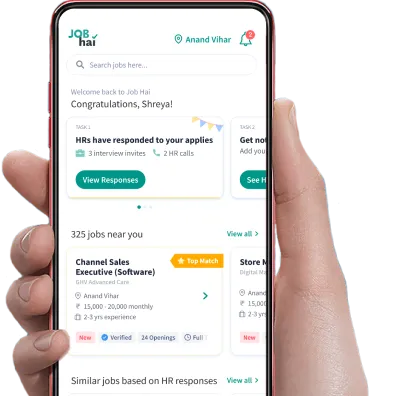Speshally Nhs
Andheri (West), Mumbai
Graduate
Skills: Stock Taking, Order Processing, Freight Forwarding, Inventory Control, Order Picking, Packaging and Sorting
Blackbuck
Andheri (West), Mumbai
Below 10th
New
90 Openings
Flexible shift
0 - 6 years Experience in Warehouse / Logistics
Uber
Andheri (West), Mumbai
Below 10th
90 Openings
Flexible shift
0 - 6 years Experience in Warehouse / Logistics
Instakart
Andheri (West), Mumbai
Below 10th
New
10 Openings
Night shift
Skills: Inventory Control, Order Picking, Order Processing, Packaging and Sorting
Warehouse / Logistics Jobs by Popular Companies in Andheri (West)
Uber
Andheri (West), Mumbai
Below 10th
90 Openings
Flexible shift
0 - 6 years Experience in Warehouse / Logistics
Madhuri Chandanshive
Andheri (West), Mumbai
Graduate
Skills: Order Processing, Freight Forwarding
Ovni Management
Andheri (West), Mumbai
Skills: Order Processing, Packaging and Sorting, Order Picking

₹15,000 - ₹23,000 /Month *
Aasan Job
Andheri (West), Mumbai
Incentives included
50 Openings
Rotation shift
Skills: Order Picking, Stock Taking, Packaging and Sorting, Inventory Control, Order Processing
Big Basket
Andheri (West), Mumbai
80 Openings
Rotation shift
Skills: Inventory Control
Krishna Placement
Andheri (West), Mumbai
Graduate
10 Openings
Rotation shift
Skills: Stock Taking, Packaging and Sorting, Order Picking, Order Processing, Inventory Control
Zepto Groceries
Andheri (West), Mumbai
New
30 Openings
Rotation shift
Skills: Packaging and Sorting, Order Picking, Freight Forwarding
Vvinayak Associates
Andheri (West), Mumbai
Graduate
Skills: Freight Forwarding, Packaging and Sorting, Order Picking, Inventory Control, Stock Taking, Order Processing
How much experience do you have?
Ikamate Hr India
Andheri (West), Mumbai
Skills: Order Picking, Packaging and Sorting, Order Processing, Stock Taking
Q K Solutions
Andheri (West), Mumbai
Skills: Order Processing, Packaging and Sorting, Order Picking

₹16,000 - ₹19,000 /Month *
Blinkit
Andheri (West), Mumbai
Incentives included
50 Openings
Rotation shift
Skills: Packaging and Sorting, Order Processing, Inventory Control, Order Picking
Warehouse / Logistics Jobs by Popular Localities around Andheri (West)
Obn Associate Express Industries
Andheri (West), Mumbai
Below 10th
0 - 6 months Experience in Warehouse / Logistics
Kisan Konnect
Andheri (West), Mumbai
Below 10th
20 Openings
Rotation shift
Skills: Inventory Control, Order Picking, Order Processing, Packaging and Sorting
Team Workforce
Andheri (West), Mumbai
20 Openings
Rotation shift
Skills: Packaging and Sorting, Inventory Control, Stock Taking, Order Picking
Jobs by Related Categories in Andheri (West)
Bestconcern
Andheri (West), Mumbai
99 Openings
Rotation shift
Skills: Order Picking, Packaging and Sorting, Order Processing
Kisan Konnect
Andheri (West), Mumbai
99 Openings
Rotation shift
0 - 6 months Experience in Warehouse / Logistics
